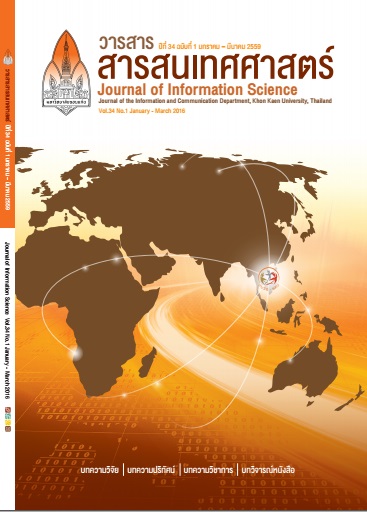สภาพการค้นคืน และการเข้าถึงความรู้ด้านพลังงานของนักวิจัย (Scholar and Researchers’ Behavior in Retrieving)
Keywords:
การค้นคืน, การเข้าถึงความรู้, ด้านพลังงาน, นักวิชาการ, นักวิจัย, Information retrieval, Information access, Energy knowledge, Scholar,Abstract
บทคัดย่อ
การศึกษาพฤติกรรมการค้นคืนและการเข้าถึงความรู้ด้านพลังงาน เป็นการวิจัยเชิงคุณภาพ ผู้ให้ข้อมูลประกอบด้วย นักวิชาการ นักวิจัย ด้านพลังงาน จํานวน 32 คน จากหน่วยงานด้านพลังงาน ได้แก่ 1) สถาบันวิจัยพลังงาน จุฬาลงกรณ์ มหาวิทยาลัย 2) บัณฑิตวิทยาลัยร่วมด้านพลังงานและสิ่งแวดล้อมมหาวิทยาลัยเทคโนโลยีพระจอมเกล้าธนบุรี 3) กรมพัฒนาพลังงานทดแทนและอนุรักษพลังงาน กระทรวงพลังงาน และ 4) การไฟฟ้าฝ่ายผลิตแห่งประเทศไทย (บางกรวย) โดยใช้แบบสัมภาษณ์แบบมีโครงสร้างเป็น
เครื่องมือวิจัย
ผลการศึกษาประเด็นด้านบริบทการค้นคืนความรู้ด้านพลังงาน พบว่า (1) ผู้ใช้มวัตถุประสงค์ในการค้นค้นความรู้ทั้งที่เหมือนกันและแตกต่างกันตามบทบาทหน้าที่ กลุ่มนักศึกษาและผู้ปฏิบัติงานมีวัตถุประสงค์ในการค้นเพื่อติดตามความก้าวหน้า การค้นหา
วิธีการ (Know-how) เพื่อนํามาใช้ประกอบการวิจัยหรือการถ่ายทอดความรู้ด้านพลังงาน
เช่น การบรรยาย การเขียนบทความ กลุ่มที่เป็นอาจารย์และนักศึกษา ทําการค้นคืนความรู้
เพื่อนํามาใช้ในงานด้านวิชาการประกอบการเรียนการสอนและการทําวิจัย ในขณะที่กลุ่มผู้ปฏิบัติงานค้นคืนเพื่อนํามาใช้ประกอบการปฏิบัติงานในหน้าที่การทํางาน สวนกลุ่มผู้บริหารค้นคืนเพื่อวางแผนและกําหนดนโยบายพลังงาน แนวปฏิบัติที่ดี (Best practice)
ในการทํางานด้านพลังงาน (2) ผู้ใช้ค้นคืนความรู้ด้านพลังงานในประเด็นเนื้อหาเกี่ยวกับเทคโนโลยีหรือวิธีการทางด้านพลังงาน (Know-how) มากที่สุด ใช้แหล่งสารสนเทศอิเล็กทรอนิกส์มากที่สุด รองลงมาแหล่งบุคคลที่เป็นผู้เชี่ยวชาญด้านพลังงาน และแหล่งสถาบันใช้น้อยที่สุด โดยมีแนวทางการประเมินแหล่งสารสนเทศในการความสําคัญกับแหล่งสารสนเทศที่มี เนื้อหาที่ต้องการมากที่สุด องลงมาได้แก่ แหลงสารสนเทศที่สามารถเข้าถึงได้ ง่ายและมีเครื่องมือในการเข้าถึงเนื้อหาแหล่งสารสนเทศที่มีความน่าเชื่อถือ เช่น ฐานข้อมูลอิเล็กทรอนิกส์ ได้แก่ ScienceDirect และ Scopus ทั้งนี้ผู้ใช้ทุกกลุ่มและทุกคนค้นคืนความรู้ด้านพลังงานจากคําสําคัญ (Keyword) คําที่สัมพันธกับเรื่องที่สนใจมากที่สุด ชื่อเรื่อง (Title) เรื่อง (Topics)
Abstract
This qualitative study examined 32 researchers’ retrieving and accessing energy knowledge at (1) The Energy Research Institute of Chulalongkorn University, (2) The Energy and Environment Joint Project of King Mongkut University of Technology - Thonburi, (3) The Alternative Energy Development and Energy
Conservation Department of the Ministry of Energy, and (4) The Electricity Generating Authority of Thailand. The research employed structured interview forms for collecting data.
The study findings indicated that study sample retrieved energy information to suit their needs. For example, the student researchers and energy workers sought for energy knowledge for pursuing new energy advancement and for acquiring the know-how for research engagement and energy knowledge
dissemination, such as giving lectures and writing articles. The teaching faculty and students accessed energy knowledge for teaching, learning, and research conducting. As for the energy managers, they retrieved energy information for energy policy formulation and best practices.
From the analysis of the data, it was found that the energy knowledge contents retrieved by the sample at the maximum level were the energy technology and its know-how. The most frequently used information sources were electronic
sources followed by the energy experts, while the least source used was the institutions. In addition, they gave the highest importance on the energy information that answered their needs, followed by the information which was easily accessible
having guidelines for accessing it, such as Science Direct and Scopus databases. The sample was found to be able to carry out the information retrieval. The most used searching terms were keywords, titles and topics.








